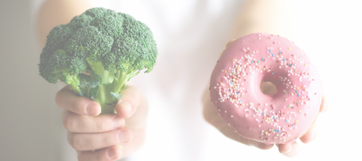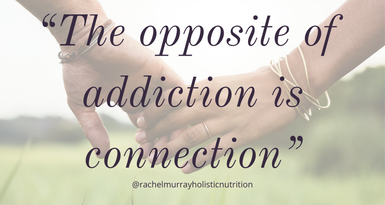|
11/24/2021 0 Comments Willpower is An Unrealistic StrategyWhen it comes to sugar addiction, willpower is an unrealistic strategy.
Now before we get started on understanding why willpower doesn’t work for sugar addiction (or any addiction), let’s determine what exactly willpower is. The Miriam-Webster dictionary defines willpower as “the ability to control one's own actions, emotions, or urges”. Sounds simple enough. Why would improving our willpower not help us with sugar addiction? Well, I’ll let you in on a little secret. Our addiction isn’t really us. Yes, I know that sounds a little ridiculous; it’s our brain that’s craving the sugar isn’t it, so how is our addiction not really us? Well, let me explain. First, let’s take a moment to understand some fundamentals about the human brain. Our brain has been evolving over thousands of years. The most primitive part, sometimes referred to as the reptilian brain, is the survival part of our brain. It takes care of things live breathing and heart rate and addresses any threats to our survival; because of this, functions of this part of our brain will take precedence over any other activity in the brain. The 2nd oldest part of our brain to evolve is the limbic system, which is considered the emotional part of our brain. The limbic system deals with our “fight-or-flight” response when we encounter danger or potential and works very quickly to make decisions that keep us safe. The limbic system also plays an important role in terms of the dopamine reward center. It is dopamine that we most often refer to as giving us the pleasurable feelings, and tells us to keep doing the things that elicit that response. Interestingly, our brain doesn't specify exactly what you should feel good about, so anything that triggers those good feelings can get caught up in the process of reinforcing behaviors. As far as the dopamine reward circuit is concerned, getting a hole in one enacts the same process as eating a cookie. In addition to this, the limbic system hasn’t caught up to our modern-day realities, and can mistakenly perceive imagined stressors as real, and can throw us into the stress response unnecessarily, which can exacerbate any existing real or perceived stress we may be feeling. To escape these stressful feelings, our brain seeks out past behaviours that have shown to make us feel better, even if just momentarily. This is where sugar addiction comes into play. Sugar consumption leads to the dopamine release which can cause us to briefly switch our focus to dampen the negative feelings and provide us with short-lived pleasure. Next, we look at the prefrontal cortex, which is the newest part of our brain. The prefrontal cortex is capable of complex thinking on technical, emotional, social, and logical planes. While this part of our brain is amazingly smart and sophisticated, it can also be “hijacked” by the limbic system. I like to think of it as the little sister, who knows better, but loses power over a situation when mom isn’t there to step in and prevent big brother (the Limbic system) from making a risky, self-serving decision. So, we can see that the brain is very complex. And parts of the brain are actually working against each other at times. This is what I meant by the concept of our addiction not really being us. Different parts of our brain have different priorities, and they aren’t always in our best interests. In my addiction recovery community, we refer to the addicted part of our brain as The Red Dog. This Red Dog is self serving and looks only to serve his own needs of getting that short-lived dopamine response. The Red Dog doesn’t care about long term well-being, and doesn’t care about the damage it leaves in its wake. The Red Dog lives only for himself and has no interest in our overall health and happiness. Now, let’s bring this back around to why willpower doesn’t work for finding and maintaining recovery from sugar addiction. Relying on willpower is like letting that Red Dog go out and play in the mud but hoping it won’t bring the mud into the house through the open door. You can hope all you want, but unless you take some precise action (like closing the door) the Red Dog, along with the mud, is coming in!!! Relying on willpower can also be likened to playing with fire. At some point, you’re going to get burned. You wouldn’t suggest a recovering alcoholic try to moderate their alcohol intake using willpower; getting into, and staying in recovery means abstaining from alcohol. And there are some specific actions that need to be taken along with the abstaining piece. It’s the exact same for sugar & carb addiction. This often brings ups questions like, “Well, isn’t sugar different, because, unlike alcohol or drugs, we need food to survive?” Hmm, try thinking of it like this. All of us, including the alcoholic, needs to drink fluids to stay hydrated and healthy. However, alcohol cannot meet these needs. Sugar is the same. While we do need food to survive (specifically protein and fat), we do not NEED sugary processed drug foods. And expecting a sugar addict to rely on willpower to moderate their sugar intake is the same as expecting an alcoholic to find and maintain recovery while still drinking on the weekends. So, if it’s not about willpower, what is the most important thing that recovering {sugar} addicts tap into that helps them get into, and stay in recovery? Connection. Yep, it’s that simple, connection. This connection helps us re-wire our brain and strengthens the pre-frontal cortex (our smart, sophisticated little sister) so that we can overpower the “hijacking” limbic system (self-serving big brother/Red Dog). Connecting with others who are on the same path, those who understand the wild and destructive emotions, thoughts and feelings that have accumulated over the years. Emotions, thoughts and feelings that begin to unearth themselves as we put down the drug foods. Connecting with those who understand how powerful the cravings of the Red Dog can be, but are there to suggest strategies, give support and offer kind words. Connecting with those who perhaps have found strength & hope in a higher power, even after a lifetime of rejecting any type of spirituality. Now, I did say that connection was simple, but I didn’t say it was easy. Sometimes seeking connection is one of the most difficult things we must do. Connecting with others means being vulnerable. It often means admitting things to ourselves and others that we never thought we could. How do we start? Where do we start? What do we say? I suggest starting with one simple four-letter-word - “help”. Find someone who you trust, and just ask for help. People like myself, who have stood where you are standing would be honoured to help you get started on your recovery journey. If it’s not me that you resonate with, then please know there’s recovery support for everyone. There are dozens of recovery groups available and the list of trained recovery coaches, counsellors and practitioners is growing every year. If the Red Dog is barking at your door, please reach out and I'll help you get connected. In Good Health, -Rachel
0 Comments
11/24/2021 1 Comment The Opposite of Addiction is ConnectionThis phrase has been popping up everywhere for me lately. When things like that happen, I believe it’s a sign from the universe that some kind of action needs be taken.
In this case, I feel that action is nurturing new connections and fortifying longstanding relationship in my life. This has been a growing challenge in the past 2 years, and it’s time for a change. The issue I’ve faced for as long as I can remember, is that I feel that I’m different from everyone else. Like I don’t fit in. At times, even with my closest friends, something in my head has told me, “You don’t belong here” or “They just feel sorry for you, they don’t really enjoy your company”. I know now that is the addicted part brain talking; trying to keep me isolated so that I would stay focused on seeking out that dopamine. If you’ve ever felt like this, please reflect on this sentiment that one of my mentor’s has shared recently, “The moment you were born was the moment that the universe decided it couldn’t exist without you”. So, please know that you are loved. You deserve to be here, and you deserve to be happy. If you want or need connection today, please don’t hesitate to reach out. Email me at: [email protected] |
Archives
December 2023
This website uses marketing and tracking technologies. Opting out of this will opt you out of all cookies, except for those needed to run the website. Note that some products may not work as well without tracking cookies. Opt Out of Cookies |
|
© 2023 Rachel Murray Holistic Nutrition
|


